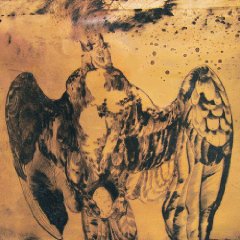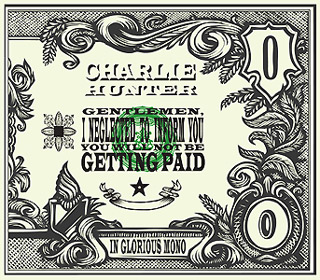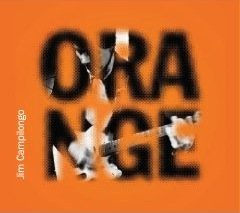Yakety Axes
By David McGeeThe Glass Bead Game
James Blackshaw
Young God RecordsGentlemen, I Neglected To Inform You You Will Not Be Getting Paid
Charlie Hunter
Spire Artist MediaOrange
Jim Campilongo
Blue Hen RecordsTwo veterans and, by comparison, a relative newcomer (despite having released eight albums now) are sporting new long players that demonstrate the continued vitality of instrumental music, specifically instrumental guitar music, that is both technically admirable and abundant in the human touch. Yes, we know about the uncategorizable and brilliant Bill Frissell, but the trio represented here works a different side of the street than Frissell, or even, say, Bryan Sutton from the rootsier neighborhood. Each has his own territory mapped out, the twain never meets, and to hear these albums consecutively is to take a trip through a wondrous and varied musical landscape. How you receive this music on a personal level is your own business, but hats off to the artists for giving their listeners plenty of room to free-associate with their own memories and passions as the music plays on.
Racking up an Everest-like mountain of critical plaudits is baby-faced British master of the 12-string, James Blackshaw, who has been on a recording tear since emerging in 2004 on the CD-R, Celeste—The Glass Bead Game is his eighth album, and his most ambitious yet. Blackshaw is pursuing a grand vision, creating dreamy, cosmic, nigh on to hallucinogenic soundscapes out of ostinato riffing; the ringing overtones from his steel strings; disembodied, chanting voices; ghostly strings rising, falling and crying seductively; even the sound of wind blowing through the tracks. These devices reoccur like thematic signposts throughout, connecting one movement to the next and lending the proceedings the feel of a single composition in five movements: “Cross,” “Bled,” “Fix,” “Key,” “Arc.” That’s it; those are the songs comprising The Glass Bead Game. Accompanying Blackshaw are Joolie Wood (violin, clarinet, flute), John Contreras (cello) and Lavinia Blackwell (vocals). In an uncredited role, someone is playing energy efficient piano, too, as in the repeating, mordant phrase underpinning the moaning languor of “Fix.” Again and again Blackshaw returns to a rolling, anxious guitar figure—no sooner has “Fix” faded out than we hear it anew at the start of “Key,” and the sound of Blackshaw’s fingers squeaking across the strings even becomes part of the song’s incessant tension. Blackshaw’s compositional style has been compared to the likes of Steve Reich and Erik Satie, but he’s more tuneful than Reich cares to be; the Satie comparison is apt, though, in that Blackshaw seems wholly unconcerned with development in his compositions and more enamored of repetition as an atmospheric device, an approach he takes to epic lengths in the 18-and-a-half minute closing track, “Arc,” built on a restless, cascading piano figure over which the other instruments hum in unison but are indistinguishable from one another. (It’s useful to remember that Satie’s “Vexations” contains no less than 840 repetitions of the musical motif.) You wouldn’t be mistaken if you thought you detected some Philip Glass mysticism as the song meanders like a stream flowing unimpeded around bends, over rocks, into rapids and finally emptying into a wide expanse of sunlit river where it is greeted by the sound of angels offering a warm, comforting benediction as it reaches its ultimate destination—and nowhere in this masterfully choreographed composition is a guitar to be heard. That’s some kind of daring gambit on Blackshaw’s part, but it’s a measure of how well he succeeds that you don’t realize his signature instrument is absent, or how little, in the whole scheme of things, the guitar actually figures into the five movements of The Glass Bead Game. Some day he may have some explaining to do, but for now you are allowed to be awed and ask questions later.
Blackshaw is dealing some heavy stuff on The Glass Bead Game, so Charlie Hunter’s funky but laid-back workouts on his 17th album as a bandleader, Gentlemen, I Neglected To Inform You You Will Not Be Getting Paid (which sounds like a phrase Hunter has probably heard before in his performing career), offer a chance to loosen up and lighten up. Accompanied by Eric Kalb on drums, Alan Ferber and Curtis Fowlkes on trombones and Eric Biondo on trumpet, Hunter maintains a winning, mellow mood on Gentlemen—even on “Antoine,” when the horns get rowdy and obstreperous, Hunter counters not with an aggressive flurry but with a series of easygoing single notes, a calming influence in the midst of a freakout. Those unfamiliar with Hunter may wonder, Where’s the bass? He’s it. Hunter’s instrument of choice is a custom-made seven-string guitar by Jeff Traugott on which he plays lead and bass simultaneously. For the most part, Hunter and his mates work a southern axis, one running principally from Memphis to Muscle Shoals, with a taste of New Orleans for extra flavoring. One of the supremely slow grooving moments here, and arguably the one most suitable for the art of seduction, is the slow grinding “Tout Ce Qui Brille Ne Pas Or,” featuring short, sharp washes of horns around which Hunter converses in mellow, soothing phrases, playing off of and with the horns in a medium-cool musical pas de deux. The horns’ humorous rhythmic hesitations and Hunter’s contrasting purposeful forward surge in “Ode to My Honda Odyssey” and the slow drag of “Every Day You Wake Up New York Says No” (in which Hunter’s forlorn noting conjures the abject feeling the city grind can promulgate in its denizens when things aren’t going right) tell stories perhaps better than lyrics could—or at least allow you to imagine both folly and frustration in whatever degrees of magnitude work for you. Hunter’s stripped down approach to storytelling is in stark contrast to James Blackshaw’s highly romanticized conceptions—whereas the latter participates as one part of a complex whole, and sometimes disappears completely and by design as the authorial voice, Hunter, no matter how spare his dialogue with the horns, is the dominant personality in his soundscape with tasty, to the point soloing that speaks volumes in its spare outpourings.
On Orange, his first album since 2006’s Heaven Is Creepy, Jim Campilongo explores various textures of the electric guitar, from the spikey protestations driving “Fingerpuppet” to the robust, precise, full notes falling all around like snowflakes in the Chet Atkins-Les Paul-style frolic of “Awful Pretty, Pretty Awful,” which is the former and not at all the latter part of that title (and one hopes not his opinion of the music therein, either). Joined by Stephan Crump on acoustic bass and Tony Mason on drums and percussion, Campilongo is a smart, fluid stylist who jumps around genres in an impressive display of idiomatic fluency and technical grace. A tribute to Roy Buchanan, “Blues for Roy,” evokes that late master’s spirit in its host of bends, fleet runs, dissonant punctuations and wrenching howls amidst a thick, sludgy ambiance that almost collapses in on itself towards the end. “Blues for Roy” could well be a Roy Buchanan track, but no one is going to mistake Campilongo’s cover of the Stooges’ “No Fun” for anything but his own take—being that it strips the original down and reimagines it (with the help of the ragged drawl of vocalist Leah Siegel) as a deliberate, aggrieved howl, as menacing in its jagged edges and turgid pace as the original was in its pulsating, blues-driven fury. Siegel has another notable turn on disc, with a weary, disaffected, Nico-like rendering of the Stones’ “No Expectations,” with Campilongo’s reverb-drenched minimalist support emphasizing in its wan commentary the utter hopelessness Seigel embraces. Diving headlong into a whole other era, the guitarist offers a jazzy, wistful rumination, blue and weary, of Billy Strayhorn’s haunting “Chelsea Bridge.” And in what is a truly nice touch, he signs off with a charming, gentle instrumental exploration of “When You Wish Upon a Star,” sticking close to the original melody line but adding a few tasty, improvised flourishes of his own, much as a jazz vocalist would in seeing where a certain phrase might end up before returning to the main text. Like Charlie Hunter on Gentlemen…, Campilongo is given to economy of expression—even on the red-hot album opener, “Backburner,” he keeps the pyrotechnics tight and to the point—and by contraction actually enlarges the dialogue for his listeners. Any way you cut it, what Blackshaw, Hunter and Campilongo are doing for instrumental guitar music of various breeds is laudable for numerous reasons, not the least being the perpetuation of a proud but as of late woefully underrepresented stream of the mainstream discourse.
(Charlie Hunter Photo byJon Solomon)
James Blackshaw, The Glass Bead Game, is available at www.amazon.com
Charlie Hunter, Gentlemen, I Neglected To Inform You You Will Not Be Getting Paid is available at http://www.fastatmosphere.com
Jim Campilongo, Orange, is available at www.amazon.com
Founder/Publisher/Editor: David McGee
Contributing Editors: Billy Altman, Laura Fissinger, Christopher Hill, Derk Richardson
Logo Design: John Mendelsohn (www.johnmendelsohn.com)
Website Design: Kieran McGee (www.kieranmcgee.com)
Staff Photographers: Audrey Harrod (Louisville, KY; www.flickr.com/audreyharrod), Alicia Zappier (New York)
E-mail: thebluegrassspecial@gmail.com
Mailing Address: David McGee, 201 W. 85 St.—5B, New York, NY 10024





